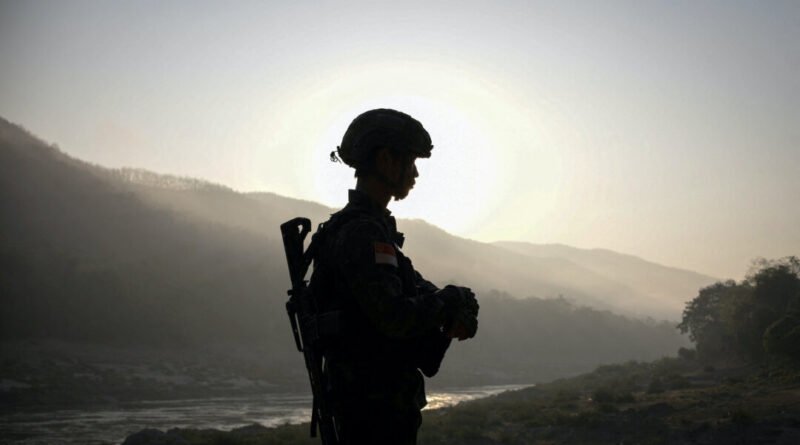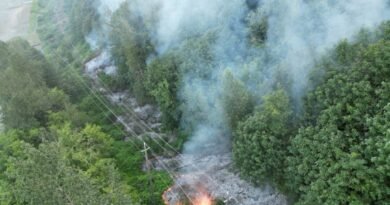China carries out military exercises on Yunnan border amid escalating conflict in Burma.
The civil war in Burma has intensified this year despite efforts by Beijing to exert its influence on both the Burmese junta and rebel groups.
The Chinese People’s Liberation Army has been conducting live ammunition drills and armed patrols in west Yunnan Province near the China–Burma border as the civil war escalates in the neighboring country.
The Chinese Communist Party’s (CCP’s) Southern Theater Command is currently conducting a three-day joint exercise that began on Aug. 27, as announced on its official WeChat account.
This command has also been involved in border armed patrols and joint air-ground police patrols in Yunnan’s Ruili and Zhenkang counties near Burma since Aug. 26.
Intensified Conflict
The conflict in Burma has worsened this year despite Beijing’s efforts to influence both the Burmese military junta and rebel groups to protect China’s economic interests in the region.
In early January, a shell fired from Burma hit Nanshan, a border town in Yunnan Province, injuring five Chinese citizens. Following this incident, the Burmese military junta and three local ethnic armed groups in northern Burma reached a ceasefire agreement mediated by Beijing.
However, renewed fighting between the Burmese military and the Arakan Army in Rakhine State in April indicated the failure of Beijing’s mediation.
In June, the Ta’ang National Liberation Army, a part of the Three Brothers Alliance, launched attacks on junta strongholds in northeastern Shan State and the adjacent Mandalay region, bordering China, Laos, and Thailand.
As a result, the ceasefire agreement collapsed entirely, leading to an increase in the civil war’s intensity since July.
Min Aung Hlaing, the Burmese army general who took power after the February 2021 coup, has accused foreign forces of supporting the various rebel groups in Burma with weapons, technology, and other resources. Some believe he was referring to China, which has historical ties with ethnic rebel groups in the China–Burma border regions.
The CCP denied any involvement in Burma’s civil war during a visit by its foreign minister Wang Yi on Aug. 14.
Geopolitical and Economic Motives
Sun Kuo-hsiang, a professor at Taiwan’s Nanhua University, stated on Aug. 27 that it is unlikely for Beijing to deploy troops to Burma. “Deploying troops to Burma would attract international attention and could entangle China in larger regional conflicts, which goes against Beijing’s strategic interests,” he explained.
Instead, Sun suggested that the CCP is more likely to influence the situation in Burma and protect its interests through providing intelligence, logistical support, and potentially secret military assistance to the side that benefits it.
Furthermore, “China aims to act as a stabilizing force in Burma to prevent the nation from aligning with Western countries, serving the CCP’s geopolitical interests,” Sun added.
China is a significant investor in Burma, with projects like the China–Myanmar Economic Corridor, which includes energy pipelines and extensive infrastructure development, being strategically important.

Chinese military officers attend a ceremony to mark Burma’s 78th Armed Forces Day in Naypyidaw on March 27, 2023. STR/AFP via Getty Images
Chung Chih-tung, an assistant research fellow at Taiwan’s Institute for National Defense and Security Research, shared with The Epoch Times on Aug. 27 that the CCP’s military activities near the border serve as training opportunities and demonstrate its readiness to intervene in the Burma civil war if necessary.
Chung also noted that unless the situation in Burma becomes uncontrollable and Western nations interfere, “deploying troops to participate in the civil war in Burma would be a last resort for the CCP.”
Playing Different Sides
Sun highlighted the CCP’s delicate balancing act within Burma.
“While Beijing has a long-standing relationship with the Burmese military government, it also maintains connections with ethnic rebel groups in northern Burma like the Kokang and the Ta’ang,” he explained.

Members of Bamar People’s Liberation Army (BPLA) clean their guns in territory belonging to the Karen National Liberation Army (KNLA), in Karen State, Myanmar, March 8, 2024. The BPLA was formed in April 2021 to fight the junta after it toppled an elected government. The group has been a key player in Operation 1027, a joint offensive with other rebel militias that has significantly weakened the military. Stringer/Reuters
Chung added that while Beijing supports the Burmese military government, it must maintain a delicate balance. “If both the rebels and the military government rely on Beijing’s support, it can showcase Beijing’s dominance in Burma,” he stated.
Sun noted that international efforts to support Burma’s democratization and counter the CCP’s influence have been limited due to Beijing’s obstruction. Moscow, a close ally of Beijing, has also been a supporter of Burma’s junta.
“China and Russia have consistently opposed sanctions against Burma’s military regime in international forums,” Sun explained.
Chung agreed that the West’s influence in Burma is limited compared to the CCP’s control, and democratization in Burma does not align with the CCP’s interests in controlling the nation.
“The CCP will continue to back the Burmese military dictatorship, which is easier to control,” he concluded.
Luo Ya contributed to this report.





